
A ONE INSTITUTE
Feb 19, 2025
Part 1: Science Track
Today, I will be covering extracurricular (EC) activities related to science.
Understanding the Importance of EC Planning
Through numerous consultations, I have observed that both students and parents have become increasingly aware of the significance of maintaining strong academic records. Consequently, the most frequently asked questions revolve around how to structure ECs and the best strategies for pursuing them effectively.
To address these concerns, I plan to create a series of posts dedicated to various EC activities.
Today, we will take a broad approach to understanding how to strategically plan science-related ECs.
How should STEM majors structure their ECs?
What overarching strategies should be considered when preparing ECs?
These are the key questions we will explore.
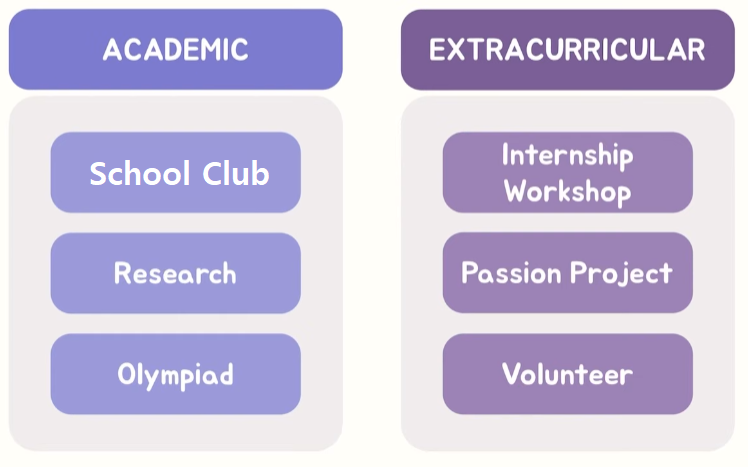
Middle School EC Planning
Extracurricular activities can be categorized into two broad types: Academic and Non-Academic. Due to the nature of science, even non-academic activities often have an academic focus.
1. Academic Activities
School Clubs
Research
Olympiads
2. Non-Academic (Extracurricular) Activities
Internships/Workshops
Passion Projects
Volunteer Work
These categories can further be divided into three activities under each, resulting in six distinct EC types.
For middle school students, the primary focus should be:
Academic: Research & Olympiads
Non-Academic: Internships/Workshops & Passion Projects
Olympiads in Middle School
Science Olympiads, such as those in Chemistry, Physics, and Biology, follow a standardized format:
Initial Selection: Students qualify through preliminary rounds.
Advanced Rounds: Those who pass progress to further competitions.
Final Selection & Training Camp: The top students undergo rigorous training before taking a final exam to determine national representatives.
Students should only pursue Olympiads if they can comfortably keep up with the content. Olympiads are significantly more challenging than AP or IB coursework. If a student finds Honor-level high school courses difficult, Olympiad preparation may not be suitable. However, if a student demonstrates aptitude, engaging in Olympiad preparation can be beneficial.
Since Olympiad exams require knowledge beyond standard high school curricula—often covering undergraduate-level content—it is advisable to refer to previous videos or guides for detailed preparation strategies.
For those interested in Olympiads, a sequential approach is recommended:Honor Courses → AP/IB → Olympiads → Research
Non-Academic (Extracurricular) Activities in Middle School
For non-academic ECs, the primary focus should be on Internships and Passion Projects. Instead of an exhaustive list, I will provide an overview and suggest looking up specific programs for more details.
Academic Enrichment & Research-Based Experiences
Broadcom MASTERS
Science Bee
National Science Bowl
FIRST LEGO League
Skill-Building & Summer Programs
MIT Summer Programs
Johns Hopkins University Pre-College Programs
Emory University Pre-College Program
Engineering for Kids Camps
Destination Science Camps
Workshops & Experience-Based Programs
NASA Space Camp
Club SciKidz Labs
Mad Science Camps
FIRST LEGO League
Students should actively apply for these programs to gain hands-on experience. Even if they are not fully prepared, attempting applications can provide valuable learning opportunities.
For students who have started Olympiad preparation, engaging in research-oriented programs is also recommended. The National STEM Festival collaborates with educational institutions and offers research-related activities for middle school students. Engaging in such programs can be a meaningful stepping stone toward future research experiences.
Ultimately, middle school should be about accumulating diverse experiences rather than specialization.
High School EC Planning
High school EC planning follows a similar structure, dividing activities into Academic and Non-Academic categories. However, the expectations become more rigorous.
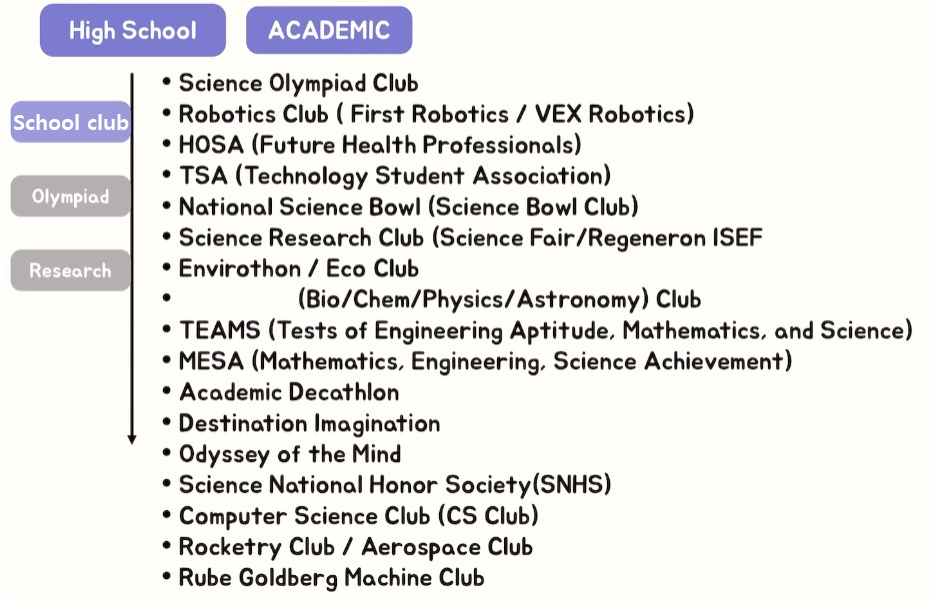
1. School Clubs & Competitions
Students should focus on clubs that provide opportunities to participate in competitions. This allows them to develop skills, contribute meaningfully, and build a competitive portfolio. Additionally, leading a club can demonstrate leadership and initiative, which are highly valued by colleges.
2. Olympiad Competitions
Students who performed well in middle school Olympiads should continue competing at the high school level. Colleges often evaluate applicants based on their achievements in well-established competitions. Even if a student does not place in an Olympiad, the preparation process helps develop advanced knowledge that strengthens performance in AP and IB exams.
3. Research & Science Fairs
High school students aiming to conduct research should strive to present their findings at competitive venues such as:
ISEF (International Science and Engineering Fair)
JSHS (Junior Science and Humanities Symposium)
National STEM Festival
BioGENEius Challenge
4. Research Publications for High School Students
If research does not result in competition awards, an alternative pathway is to publish findings in high school-friendly journals:
Journal of Emerging Investigators (JEI)
The National High School Journal of Science (NHSJS)
The International Journal of High School Research (IJHSR)
The Young Researcher
Journal of Student Research (JSR)
MIT THINK Scholars Program
American Junior Academy of Science (AJAS)
American Chemical Society (ACS)
American Physical Society (APS)
Publishing research in these journals can enhance a student’s profile significantly, as top universities actively recognize such achievements.
5. Non-Academic (Extracurricular) Activities in High School
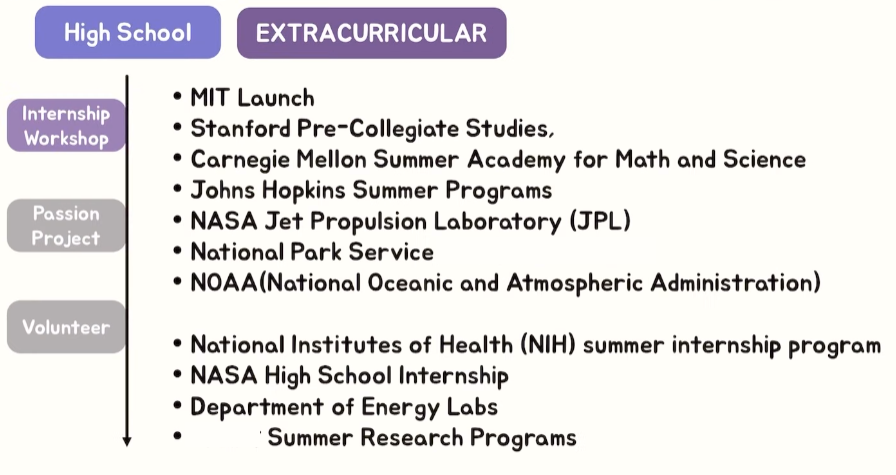
Internships & Workshops (Starting in 9th Grade)
MIT Launch
Stanford Pre-Collegiate Studies
Carnegie Mellon Summer Academy for Math and Science
NASA Jet Propulsion Laboratory (JPL)
National Institutes of Health (NIH) Summer Internship
Department of Energy Labs
6. Passion Projects
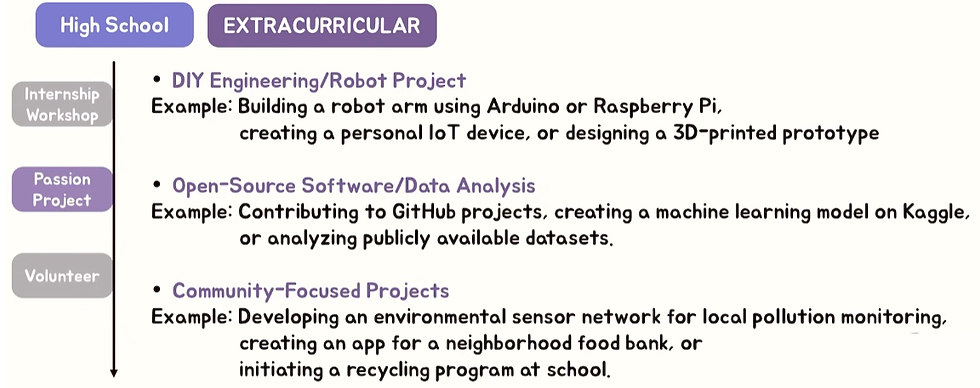
Passion projects can be individual or group-based and may include:
DIY Engineering/Robotics Projects
Open Source Software & Data Analysis
Community-Focused Initiatives
7. Volunteer Work
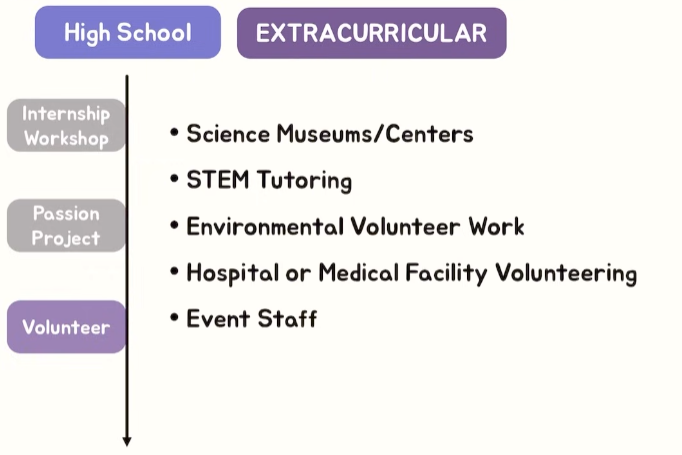
Science-related volunteer activities include:
Science Museums/Centers
STEM Tutoring
Environmental Volunteering
Medical Facility Volunteering
Event Staff for Science Competitions
Final Thoughts
A structured and proactive approach to ECs can set students apart in the college admissions process. If students engage in a balanced mix of competitions, research, internships, and volunteer work, they can build a compelling academic and extracurricular profile.
For students in 9th and 10th grade, the primary focus should be exploration and skill development rather than immediate specialization. By starting early, students can identify their strengths and refine their EC portfolio accordingly.
For more information, feel free to contact A-One Institute.
Thank you.

